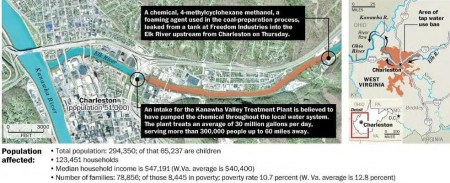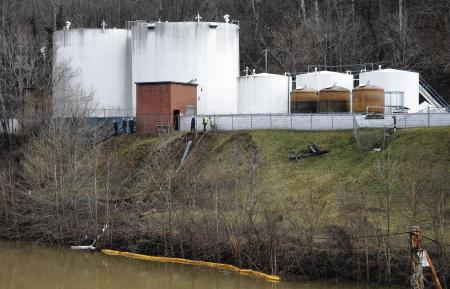A nationally publicized and highly contentious chemical spill occurred along the Elk River of West Virginia (WV) on 9 January 2014; during this, a significant amounts of a poorly researched chemical used in coal-scrubbing, 4-methylcyclohexanemethanol (MCHM), was accidentally discharged into the Elk River from a cracked/faulty chemical holding tank owned and operated by Freedom Industries, a subsidiary of the Fortune 500 Eastman Chemical Co.
Tragically, the spill occurred just upstream from West Virginia American Water’s primary intake, treatment and distribution center. The location of the spill resulted in contaminated water reaching ~300,000 citizens, representing nine counties in the Charleston, WV, metropolitan area.
 Graphic of the 2014 Elk River Spill; source: Washington Post
Graphic of the 2014 Elk River Spill; source: Washington Post
 Defective MCHM holding tanks; source: LA Times
Defective MCHM holding tanks; source: LA Times
Following the Spill, investigations determined that MCHM likely poses few health concerns, in the diluted amounts people in the area encountered, but this was determined only after its release into public waters. In addition, the spill itself, and related policy actions (e.g., passage of WV SB 373) highlighted critical health and safety concerns, especially regarding above-ground chemical holding tanks like the one that leaked MCHM into the Elk River, and instituted robust regulatory solutions. This was short lived, however; several years post-Spill, WV SB 423 was passed, which eased/erased WV SB 373’s stricter regulations.
In 2018, filmmaker Cullen Hoback, released the exposition piece What Lies Upstream; the documentary details the Elk River Spill and presents shocking evidence of health and safety laws (e.g., WV SB 423) being written by the corporate entities the laws are intended to monitor and regulate (specifically West Virginia American Water and Eastman Chemical Co.) and subsequently voted into law by (evasive) politicians who seem never to have even read the corporate-drafted documents being sponsored.
In light of these revelations I implore concerned citizens to contact and support West Virginia clean water advocacy groups like the West Virginia Rivers Coalition, and subject matter experts like Drs. Andy Whelton and Marc Edwards, both featured in What Lies Upstream, in their attempts to repeal WV SB 423 and reinstate more rigorous health and safety regulations in WV SB 373.
 Discolored tap water in WV; source: What Lies Upstream (2018)
Discolored tap water in WV; source: What Lies Upstream (2018)
August 23, 2018 at 11:32 am |
Thank you for writing this blog. I completely agree, with the article. More research is definitely needed in the form of a massive public study on the elderly and recent births in the region. I would argue that we don’t know enough about this chemical works or the effect it has on the human body.